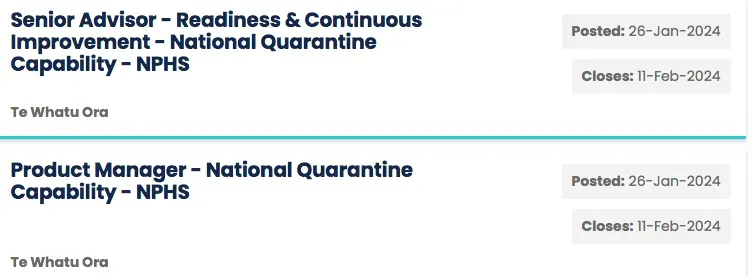Table of Contents
AI
Thanks to a coalition agreement promise – the Royal Commission of Inquiry into the Covid-19 response will finally open up for public consultation on their terms of reference this month.
Much of what happened in Covid has gone un-questioned by both government and media which means deeply problematic aspects of the Covid response are now embedded in government.
Under vote health in the April 2022 budget, funding was secured for two years of almost $7 million for New Zealand’s future quarantine and isolation capability.
This is presumably the short-term funding that the Ministry of Business, Innovation and Employment (MBIE) recommended until it can be absorbed into baseline funding to continue work on a quarantine readiness plan and maintain various contractual arrangements with former Managed Isolation and Quarantine (MIQ) suppliers like hotels and security.
Last year a document dump by MBIE, who ran the MIQ system when New Zealand’s border was closed, confirmed that a national quarantine system of up to 6,000 rooms now stands at the ready to be used as a border intervention.
Te Whatu Ora/Health NZ assumed responsibility for it in July 2023.
Although I found only the odd mention that the Bill of Rights needs to be considered – how this quarantine system will be used went largely unsaid in the dozens of MBIE documents that set it up.
Also going unsaid was the point of it for future diseases. Advice to then Prime Minister Jacinda Ardern in March 2020 stated that any merit in closing the border for Covid hinged on whether the health system could be improved by the time it re-opened. Border closures were not recommended by the World Health Organisation (WHO) as doing so would only delay rather than prevent an epidemic and cause hardship and high economic cost along the way.
Of the 189,315 people who went through MIQ to the 13th of November 2021, when it took a total of 14 days, MIQ only captured 1,401 border cases of Covid (less than 1% of people who went through to that point).
I can’t help adding – government isn’t alone of course – architects of the New Zealand pandemic response also have no quibble with bothering to review anything before making grandiose statements. Michael Baker who has sat on the Ministry of Health Covid-19 Technical Advisory Group since January 2020, is a frequent commentator in the media – in the winter of 2022 he called for the government to impose mandatory isolation on anyone who gets the flu.
Aside from the direct economic cost (excluding worker costs – MIQ cost over $1.5 billion while MBIE was running it from 2020 to 2022) there were wider costs to closing the border, including the pain and hardship that kept people out which saw a group called Grounded Kiwis launch a court case that successfully challenged the MIQ allocation aka lottery system that was used.
Was it worthwhile? Was the cost worth it? Did science even demand the use of it?
I would have hoped it would all be discussed in an inquiry. But even if it is – this doesn’t seem to matter as government has not just set this quarantine system up and spent millions on it – Te Whatu Ora/Health NZ are now recruiting permanent jobs to manage it.

A manager and a senior advisor for the national quarantine capability which the job ad states is for ‘in the event of a future pandemic’. Very sure of themselves aren’t they?
The existing Health Act 1956 lays out some powers in the Act around the potential to quarantine but legislation and policy from Covid took it far further than it had ever been used nationally before.
There’s also a short ‘list of quarantinable diseases’ in the Act (Covid was added in early 2020) which includes the plague and viral haemorrhagic fevers and unusual influenzas and novel coronaviruses. So far Ebola, a type of viral haemorrhagic fever, appears to have never been notified in New Zealand and the last time plague was notified was in 1911.
For government to set up a quarantine system to stand at the ready with no understanding of how it could or would be used to detain people, when the last attempt had such a deep impact, just seems deeply self-interested to maintain. Would there really be people employed to look after something that is never used? It reminds me of ‘if you build it, they will come’!
But the bigger question is how on earth can this happen with no inquiry first?
Some more reading:
I’ve covered the MIQ experience and it’s incredible costs, trials on self-isolation that government ran but had no plan to ever implement, and government trials at MIQ to increase surveillance of people and the MBIE document dump on this new quarantine system.









